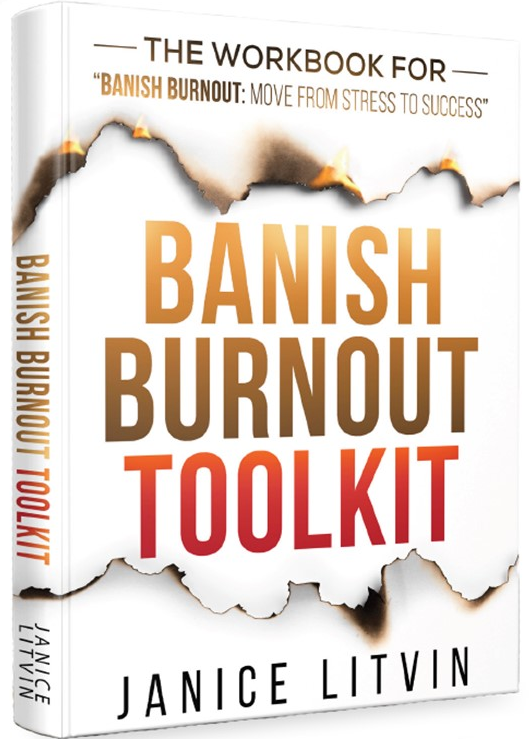Janice Litvin is on a mission to help leaders and teams banish burnout in their organizations. She does this through keynotes, workshops, and accountability groups. Her “Banish Burnout: Move from Stress to Success” program teaches people how to change the way they handle stress, from the inside out. Her new book, Banish Burnout Toolkit, now part of the SHRM recertification library, takes readers through the journey of untangling their behavior patterns so they can learn to modulate their emotions and change their behavior.
FWM: You are on a mission to help leaders and teams banish burnout in their organizations. What makes you an expert in this area?
I have been studying psychology and stress for many years. I have a certificate in Personal Training and Group Exercise from AFAA (Aerobics and Fitness Association of America), with a concentration in psychology. For twenty years, I was a recruiter in Silicon Valley, and thirdly, I worked on my own behavior change for several years before creating my Banish Burnout program. Furthermore, SHRM (Society of Human Resource Management) has brought both my workshops and book, Banish Burnout Toolkit into their recertification library.
FWM: What are common themes that clients are bringing to you?
Right now, people are worried about all things COVID-related such as how to manage their work with children running through their workspace. This leads to longer hours for mothers, in particular who work late into the night to make up for the time spent during the day managing their children’s schooling. Furthermore there are many leaders and managers who are concerned with planning the return-to-work for their companies, trying to set policies related to the vaccine and establishing protocols for safe spaces. Leaders are also focusing on crisis prevention and management for the future.
FWM: Tell us about your “Banish Burnout: Move from Stress to Success program.
My Banish Burnout: Move from Stress to Success program is anchored in the belief that most people can change the way they react to stress. I teach people how to pay attention to their extreme reactions and then how to interrupt negative thoughts which lead to negative behavior. I also talk about the common stress reactions and how to recognize them in oneself. We then talk about setting healthy boundaries and finish up with the value of having an accountability buddy or best friend at work and how to establish a relationship with one you may not already know well.
FWM: Your new book, Banish Burnout Toolkit is a powerful resource. What can we find in your book?
Besides what I mentioned in the previous question, I included one chapter on Self-Care and another called “Unpack Your Emotional Baggage.” This tool is critical because many people are bringing their emotional baggage to work and it is important to enter personal relationships with a clean slate. This means being emotionally intelligent about yourself so that you are not applying old wounds onto new relationships. My book can be found on Amazon or wherever you like to buy books online. I also sell an editable PDF version on my site, https://www.JaniceLitvin.com/book so anyone can work the workbook on any device.
FWM: Tell us about your upcoming workshops and accountability groups.
My workshops are sponsored either by corporate or association clients. I have many coming up. The ones that would be open to the public include the Savannah SHRM workshop and the HR.com conference presentation, and a Banish Burnout webinar for WELCOA.
FWM: How have you banished burnout?
This is more of an interesting question than you may realize. It is because of my experiences banishing my own burnout that I had the deepest knowledge and intuition to develop my workshops and the content for my book. While I was in the edit phase of my book, I was having lunch with Dr. Elayne Savage, PhD, Practicing Psychotherapist, Workplace Coach and Author of Don’t Take It Personally: The Art of Dealing with Rejection. Elayne reminded me that her book explained how limiting beliefs are formed and why addressing them was an important part of banishing burnout. That became the underlying concept for
Tool #3, Unpack Your Emotional Baggage. It is my contention that you cannot unload your limiting beliefs until you understand where they came from. And unloading them is key to understanding your behavior patterns, which are formed primarily from the treatment by parents and teachers.
FWM: Please share your social media links.
https://www.Linkedin.com/in/JaniceLitvin
https://www.Twitter.com/JLitvin
https://www.Facebook.com/WorkplaceWellnessSpeaker



